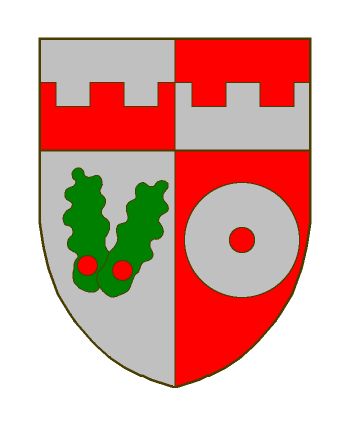Zemmer: Difference between revisions
Knorrepoes (talk | contribs) m (Text replacement - "50 pxCategory:Rheinland-Pfalz" to "Category:Rheinland-Pfalz") |
Knorrepoes (talk | contribs) No edit summary |
||
| Line 10: | Line 10: | ||
===Official blazon=== | ===Official blazon=== | ||
*(de) Schildhaupt gespalten und durch Zinnenschnitt vorn silbern-rot, hinten rot-silbern geteilt. Darunter silbern-rot gespalten. Vorn zwei grüne Eichenblätter mit zwei roten Eicheln. Hinten ein silberner Schleifstein. | |||
===Origin/meaning=== | ===Origin/meaning=== | ||
The arms were officially granted on January 2, 1992. | |||
The chief symbolises a long Roman defense wall from the 2nd century AD, that ran through the area of what is now the municipality. The oak branches refer to the local Meulenwald forest. The mill wheel refers to the sandstone mining and processing which was of great importance for the village for several centuries. Millstones were a typical product from the workshops. | |||
{{media}} | {{media}} | ||
[[Civic Heraldry Literature - Germany|Literature]] : | [[Civic Heraldry Literature - Germany|Literature]] : Information from Verbandsgemeinde Trier-Land | ||
[[Category:German Municipalities Z]] | [[Category:German Municipalities Z]] | ||
[[Category:Rheinland-Pfalz]] | [[Category:Rheinland-Pfalz]] | ||
[[Category:Trier-Saarburg]] | |||
[[ | [[Category:Trier]] | ||
[[Category:Granted 1992]] | |||
Revision as of 08:09, 18 February 2022
This page is part of the German heraldry portal |
Heraldry of the World |
|
German heraldry:
|
Selected collector's items from Germany:
|
ZEMMER
State : Rheinland-Pfalz
District (Kreis) : Trier-Saarburg (until 1969 Trier)
Verbandsgemeinde : Verbandsgemeinde Trier-Land
Official blazon
- (de) Schildhaupt gespalten und durch Zinnenschnitt vorn silbern-rot, hinten rot-silbern geteilt. Darunter silbern-rot gespalten. Vorn zwei grüne Eichenblätter mit zwei roten Eicheln. Hinten ein silberner Schleifstein.
Origin/meaning
The arms were officially granted on January 2, 1992.
The chief symbolises a long Roman defense wall from the 2nd century AD, that ran through the area of what is now the municipality. The oak branches refer to the local Meulenwald forest. The mill wheel refers to the sandstone mining and processing which was of great importance for the village for several centuries. Millstones were a typical product from the workshops.
Contact and Support
Partners:
Your logo here ?
Contact us
© since 1995, Heraldry of the World, Ralf Hartemink 
Index of the site
Literature : Information from Verbandsgemeinde Trier-Land












